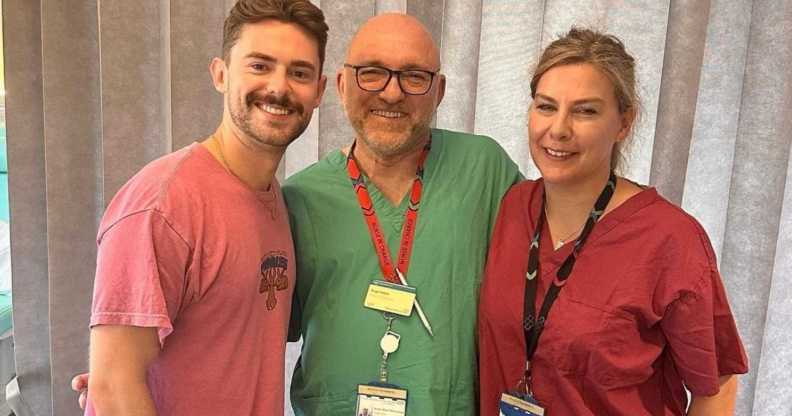I Kissed a Boy star Dan Harry on taking part in HIV vaccine trial: ‘Gratitude for previous generation’

I Kissed a Boy star Dan Harry took part in a HIV vaccine trial. (Supplied)
I Kissed a Boy contestant Dan Harry has spoken of the importance of him taking part in a HIV vaccine trial, saying his motivation for taking part as coming from his “gratitude” to the previous generation of LGBTQ+ people.
Harry, from Coatbridge in North Lanarkshire, Scotland, appeared on the hit BBC Three gay dating show earlier in the year.
Back in June, the reality TV star announced via his Instagram that he would be taking part in a “groundbreaking” HIV vaccine trial as a volunteer, which would see him exposed to a genetically engineered version of the HIV infection.
The aim of the year-long research study is to determine if a vaccine can create immunity to HIV in HIV negative adults, helping to prevent people from ever contracting the virus.
“I am doing something super important: taking part in a HIV vaccine trial which will hopefully play a part in getting rid of HIV in the world,” Harry, 27, told PinkNews.
“My blood will be taken,” he said, explaining how the study works, “and then we test on it.
“Then I will be given three doses of this vaccine, which is basically a genetically modified [virus] that’s made to look and feel like HIV. I’ll be given three doses of that over the course of the next 12 months.
“I’ll be keeping a diary as to how that makes me feel and what happens.”
He added: “We’ll see, progress and develop over that over 12 months as to how the vaccine impacts my body.”
Discussing his motivations for taking part in the trial, Harry said it “really comes from a place of gratitude for the previous generations of my community”.
“The people who have fought for the rights that I have today, so I can – for example – kiss boys on TV,” he continued.
“I want to do this as a thank you for them, because they fought so hard for us to be who we are today and to live the lives that we live today.
“But they were most significantly impacted by HIV back in the day, either by losing their lives, or by losing their loved ones and that’s something that really hits home for me.”
Harry went on to say that the responses from people in his life have been very positive about him taking part in the trial, mainly down to the fact he is “surrounded by people who are really educated and knowledgeable about all aspects of gay life and sexual health”.
However, with his now-public platform on social media, Harry has found the response from members of the public to the trial to be one of “misinformation”.
“Something that people have been asking me does this mean that I’m being injected with HIV and therefore will I then be HIV positive? No, that’s not the case. This vaccine doesn’t contain HIV,” he clarified.
He added that another “big misconception” about the vaccine is that the main demographic that it aims to serve is “gay men in the UK” but “actually that’s not the case”, Harry said.
The vaccine will be vital for groups who do not have access to PrEP in the way the LGBTQ+ community in the UK does, such as women living in poverty around the world.
‘As important today as it is and was in 1994’
Speaking with PinkNews, Sheena McCormack, a professor of Clinical Epidemiology at University College London (UCL) and Honorary Consultant at Chelsea and Westminster NHS Foundation Trust, who has worked on HIV prevention trials since 1994, said HIV is a “touch virus” and so scientists have “got to think of something really quite different in the design of these vaccines”.
“This prevention trial just started actually last year with the part where we were just looking at the safety of the new vaccine alone… that part’s completed,” she explained, “10 people took part and they received two vaccines and no issues when our independent trial steering committee looked at the data.
“In part two, we are randomising. So by chance, we allocate the participants to one of three groups.”
Two groups will receive the new vaccine in combination with a protein, and the third group will receive a combination vaccine we already know the immune responses to. The hope is that the new vaccine will lead to better immune responses”
Discussing the importance of the study in 2023, she said: “It’s as important today as it is and was in 1994, when I first started doing this, because today we still haven’tve never had observed an infectious disease that has been controlled without a vaccine.”
The trial is funded by the European Commission and the Swiss government and the lead organisation is Inserm-France with UK partners MRC CTU at UCL, Chelsea and Westminster and Imperial College London.
Chelsea and Westminster NHS Foundation Trust offer a range of sexual health services across London, including HIV services, sexual health advice and contraception. Find out more about local sexual services here.
To learn more about HIV and AIDS research, testing and treatment, visit amFAR or the Terrence Higgins Trust.
How did this story make you feel?

